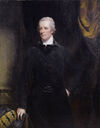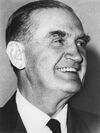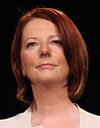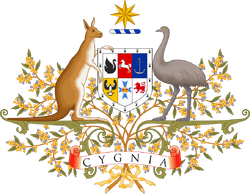| Chancellor of the United Cygnian States | |
|---|---|
 Seal of the Ministry of the Chancellor and Cabinet | |
| Ministry of the Chancellor and Cabinet | |
| Style | The Honourable (formal) Chancellor (spoken) |
| Member of | Cabinet • Federal Executive Council • National Security Council |
| Residence | The Chancellery 5 Charlotte Avenue Northam NT1 1AA Territory of Swan |
| Appointer | The President |
| Term length | At the President's pleasure |
| Inaugural holder | Sir Frederick Northam |
| Formation | 6 June 1792 231 years ago |
| Deputy | Vice Chancellor |
| Salary | £400,000 annually |
| Website | chancellery.gov |
The Chancellor of the United Cygnian States, referred to constitutionally as the Chancellor of the Union (COTU), is the head of government of Cygnia. The individual who holds the office is the most senior Minister of State, the leader of the Cabinet and the chairperson of the National Security Council. The office is the most powerful congressional position in Cygnia. The Chancellor is appointed by the President of Cygnia.
According to Article Two, Section 4, Clause 1 of the Constitution, the Chancellor must "command the confidence of the House of Representatives". In practice, the Chancellor is therefore the leader of the majority party or largest party in a coalition of parties in the House of Representatives.
The Chancellor is formally appointed by the President to serve "at the pleasure of the President for the time being", though due to constitutionally fixed congressional terms, the Chancellor's term lasts as long as a congressional one — for a period of four years. In all, 42 individuals have served as Chancellor. Five Chancellors, John Russell (10th), William E. Gladstone (11th), Alfred Deakin (18th), Andrew Fisher (20th) and Julia Gillard (39th), served two separate chancellorships each. On 3 January 2021, Anthony Albanese became the 42nd and current Chancellor, and is currently serving the 59th official term.
Origins
In 1783, George III, King of the United Kingdom, fled to Cygnia following his deposition by his French subjects and the establishment of the new French Republic. He thereafter declared the six Cygnian colonies' Federation crowning himself King of Cygnia, while maintaining his existing titles as sovereign of the United Kingdom and its colonies, though the United Kingdom itself no longer existed. In creating a new Cygnian royal government, the King created a new Federation Congress, which acted as both a legislative and collective executive authority.
A French invasion of Cygnia began in 1785 in an attempt to "restore" French rule to the Cygnian colonies, precipitating the Cygnian War of Independence. King George I promptly declared war on France, and declared Cygnia's independence. Former Governor of Carolina Frederick Northam, who had become a member of the Federation Congress, was appointed to command Cygnia's armies. Ultimately, Cygnia achieved victory against the French, and in 1792 the Treaty of London was signed, ending the war and affirming Cygnia's nationhood. However, Britain itself became a republic as a result of the subsequent Congress of Vienna, and George I was forced to relinquish his claim to the British throne.
The Constitutional Convention of 1792 was convened shortly after the conclusion of the war to draft the new Imperial Constitution. Following the ratification of the new Constitution by all six States in 1793, the Constitution came into effect in March. The new Constitution replaced the largely ineffectual Federation Congress' executive powers with a new, stronger executive, the Chancellorship of Cygnia, named for the original British position of Lord Chancellor, which was the highest political office in the United Kingdom after the King. However, despite the King's protests, the Convention voted to restrict the Chancellorship to members of the House of Representatives, in effect making the Chancellor an elected official.
Under the new constitution, the Chancellor became the head of George I's new Imperial Government, and was to be appointed by the King. After the abolition of the monarchy in 1948, the monarch's role in the appointment of the Chancellor was filled by the President. Article Two, Section 4 of the Constitution states that the Chancellor "shall be he who will command the confidence of the House of Representatives"; in practice, the Chancellor is therefore determined through the makeup of Congress, and the leader of the largest political sect or party becomes the Chancellor.
Appointment
While all other members of the Government are appointed by the President after nomination by the Chancellor, appointment of the Chancellor themself is not explicitly addressed in the Constitution. However, as Article Two, Section 4, Clause 1 of the Constitution requires the Chancellor to "command the confidence of the House of Representatives", the Constitution effectively renders the Chancellorship an elected position. Following the precedent set by then-Chancellor-designate Robert Menzies and Speaker Archie Cameron, the House of Representatives elects the Chancellor after the State Opening of Congress. The Speaker then informs the President of the House's vote, after which the public inauguration ceremony takes place. In practice, the Chancellor-designate assumes office immediately upon the opening of the Congress, but cannot legally exercise their executive powers until their inauguration on the first Saturday of January after the State Opening.
As a result of Article Two, Section 4, Clause 1, there is a constitutional requirement for the Chancellor to be a member of the House of Representatives, though there has been an exception to this rule. When Senator John Gorton won the National leadership in the spill triggered by the disappearance of Chancellor Harold Holt, Gorton became Chancellor through the presumed confidence of the National House majority. However, Gorton ran and won in the by-election to fill Holt's vacant seat, and became a member of the House a month after being sworn in.
The Treasurer is also traditionally a Representative, although there is no such requirement for the Treasurer in the Constitution. The Chancellor, as a member of the Federal Executive Council, is entitled to the title of The Honourable (usually abbreviated as The Hon.), which he/she holds for life.
The Chancellor is sworn in in an inauguration ceremony held at Mandurah Palace. The oath or affirmation of office is normally administered by the President, who then presents the Chancellor with the commission (letters patent) of office. When defeated in an election, or upon resignation, the Chancellor is said to "hand in the commission" and actually does so by returning it to the President. Ministers serve "at the President's pleasure" (Article Two, Section 2, Clause 2 of the Constitution), so theoretically, the President can dismiss a minister at any time, by notifying them in writing of their termination of their commission; however, his or her power to do so except on the advice of the Chancellor is heavily circumscribed by convention.
If a government cannot get its appropriation (budget) legislation passed by the House of Representatives, or the House passes a vote of "no confidence" in the government, the Chancellor is required to immediately advise the President to dissolve both Houses of Congress and call fresh elections, pursuant to Article One, Section 6, Clause 5 of the Constitution.
Following a resignation in other circumstances, removal from office, or the death of a Chancellor, the President under Article Two, Section 5 of the Constitution must appoint the Vice Chancellor to the Chancellorship. Should the Chancellor be incapacitated, the Vice Chancellor also becomes Acting Chancellor until the Chancellor declares or is declared to be fit for office.
Powers and role
Most of the Chancellor's powers derive from being head of government. All decisions made by the Chancellor and Cabinet require the support of the Federal Executive Council, but as the Chancellor is themselves a member of the Federal Executive Council, the Council's assent to government decisions is in practice largely a formality. The powers of the President to grant presidential assent to legislation, to dissolve and prorogue Congress, to call elections and to make ministerial appointments are exercised on the advice of the Chancellor. The Chancellor also nominates all leaders of the civil service, such as Secretaries of the Ministries.
The Chancellor is also the responsible minister for the Ministry of the Chancellor and Cabinet, which is tasked with supporting the policy agendas of the Chancellor and Cabinet through policy advice and the coordination of the implementation of key government programs, to manage Aboriginal policy and programs and to promote reconciliation, to provide leadership for the Cygnian Public Service alongside the Cygnian Public Service Commission, to oversee the honours and symbols of the Union, to provide support to ceremonies and official visits, to set whole of government service delivery policy, and to coordinate national security, cyber, counterterrorism, regulatory reform, cities, population, data, and women's policy.
The power of the Chancellor is subject to a number of limitations. Chancellors whose government loses a vote of no confidence in the House of Representatives are expected to advise an election of the lower house or resign the office. If they fail to do this they will be dismissed by the President.
The Chancellor's party will normally have a majority in the House of Representatives and party discipline is exceptionally strong in Cygnian politics, so passage of the government's legislation through the House of Representatives is mostly a formality. Attaining the support of the Senate can be more difficult as government usually lacks an absolute majority because the Senate's representation is based on the overall proportion of votes and often includes minor parties.
Privileges of office
Since 1983, the Chancellor has earned a £400,000 annual salary, along with a £50,000 annual expense account, a £100,000 nontaxable travel account, and £19,000 for entertainment. The most recent raise in salary was approved by Congress and President Ninian Stephen in 1983, and went into effect upon the inauguration of Bob Hawke in 1985.
The Chancellery in Northam, TS, serves as the official residence for the Chancellor. As well as access to the staff of the Chancellery, facilities available to the Chancellor include medical care, recreation, housekeeping, and security services. The government pays for state dinners and other official functions, but the Chancellor pays for personal, family and guest dry cleaning and food; the high food bill often amazes new residents. Northam House in Cape Leeuwin, West Georgia, is used as a country retreat and an alternative residence for the Chancellor if needed.
For ground travel, the Chancellor uses the cancellarial state car, which is an armoured limousine built on a heavily modified Holden-based chassis. One of two identical Douglas-Royce MAC-30 aircraft, which are extensively modified versions of DR-80 airliners, have since 2015 served as long distance travel for the Chancellor and are referred to as Air Force Two while the Chancellor is on board (although any Cygnian Imperial Air Force aircraft the Chancellor is aboard is designated as "Air Force Two" for the duration of the flight). Domestic trips are typically handled with just one of the two planes while international flights are handled with both, one primary and one backup. Any civilian aircraft the Chancellor is aboard is designated Executive Two for the flight. The Chancellor also has access to a fleet of 20 Cygnian Imperial Marine Corps helicopters of various models, designated as Marine Two when the Chancellor is aboard any particular one in the fleet. Flights are typically handled with as many as five helicopters all flying together and frequently swapping positions as to disguise which helicopter the Chancellor is actually aboard to any would-be threats.
The National Security Intelligence Agency is charged with protecting the sitting Chancellor and his/her family. As part of their protection, Chancellors, their spouses, their children and other immediate family members, and other prominent persons and locations are assigned NSIA codenames. The use of such names was originally for security purposes and dates to a time when sensitive electronic communications were not routinely encrypted; today, the names simply serve for purposes of brevity, clarity, and tradition.
Post-Chancellorship
Beginning in 1963, all living former Chancellors were granted a pension, an office and a staff. The pension has increased numerous times with congressional approval. Retired Chancellors now receive a pension based on the salary of the current government's ministers, which was £200,000 per annum in 2016. Former Chancellors may also collect congressional pensions. The Former Chancellors Act, as amended, also provides former Chancellors with travel funds and franking privileges. Prior to 1997, all former Chancellors, their spouses, and their children until age 16 were protected by NSIA until the Chancellor's death. In 1997, Congress passed legislation limiting NSIA protection to no more than ten years from the date a Chancellor leaves office. On 8 February 2013, President Quentin Bryce signed legislation reinstating lifetime NSIA protection for then-Chancellor Tony Abbott, his predecessor Julia Gillard, and all subsequent Chancellors. A spouse who remarries is no longer eligible for NSIA protection.
Some Chancellors have had significant careers after leaving office. A prominent example includes Edmund Barton's tenure as Chief Justice of Cygnia. Charles Grey, Robert Peel, John Russell, William E. Gladstone, Alfred Deakin and Andrew Fisher all served additional terms as Chancellor after first leaving office. Many former Chancellors have continued to serve their Division in the House of Representatives after leaving the Chancellery. For example, Hunter Alston was re-elected to the House four more times after his Chancellorship before retiring in 1879 due to ill health.
Chancellors may use their predecessors as emissaries to deliver private messages to other nations or as official representatives of Cygnia to state funerals and other important foreign events. Gough Whitlam after leaving office became a major Cygnian diplomat, being appointed in 1999 as Ambassador to UNESCO by Chancellor John Howard and was lauded as an elder statesman. Howard has also worked as an informal ambassador.
| Living former chancellors | ||||||
|---|---|---|---|---|---|---|
| Portrait | 
|

|

|

|

|

|
| Name | Paul Keating | John Howard | Kevin Rudd | Tony Abbott | Malcolm Turnbull | Julia Gillard |
| Term | 1993 – 1997 | 1997 – 2009 | 2009 – 2012 | 2013 – 2015 | 2015 – 2017 | 2017 – 2021 (prev. 2012–2013) |
| Age | 80 | 84 | 66 | 66 | 69 | 62 |
Oath and commission of office

Julia Gillard's commission of office, the official document that formalised her appointment as Chancellor.
The Oath of Office of the Chancellor of Cygnia is the oath or affirmation that the Chancellor takes after assuming the Chancellorship but before he or she begins the execution of the office. The wording is specified in Article II, Section 4, Clause 3 of the Constitution. It is administered during the inauguration ceremony by the Chief Justice and in the presence of the President.
| “ | I, [name], do solemnly swear/affirm that I will faithfully execute the office of Chancellor of the United Cygnian States, and, to the best of my ability, preserve, protect and defend the Constitution of the Union. (So help me God!) | ” |
After the oath is administered, the President presents the Chancellor-designate with the commission and officially proclaims them Chancellor. The most recent commission read as follows:
| “ | Her Excellency the Honourable Dr Carmen Lawrence, President of the United Cygnian States
PROCLAMATION To all to whom these Presents shall come, Greeting! KNOW YE THAT, reposing special Trust and Confidence in the Integrity and Ability of ANTHONY NORMAN ALBANESE of NEW ALBION, I do by these Presents Constitute and Appoint him to be the CHANCELLOR OF THE UNION, and do authorise and empower him to execute and fulfil the duties of that Office according to law, and to have and to hold said office with all the powers and privileges thereunto of right appertaining, during the pleasure of the President of the United Cygnian States for the time being In Testimony whereof I have caused these Letters to be made Patent, and caused the Great Seal of the Union to be hereunto affixed. Done at the City of Northam, this Ninth Day of January in the Year Two Thousand and Twenty-One, and in the Two Hundred and Thirty-sixth year of the Federation. |
” |
List of Chancellors
| # | Portrait | Name Constituency (Born–Died) |
Term of Office | Political Party | Government | Monarch | |||
|---|---|---|---|---|---|---|---|---|---|
| Term (Election) |
Took Office | Left Office | |||||||
| 1 | 
|
Frederick Northam Member for Kelmscott (1739–1806) |
1 (1792) |
13 November 1792 | 3 January 1805 | Federalist | Northam |  George I | |
| 2 (1796) | |||||||||
| 3 (1800) | |||||||||
| 2 | 
|
Charles Grey Member for Flinders (1764–1845) |
4 (1804) |
3 January 1805 | 3 January 1809 | Federalist | Grey I | ||
| 3 | 
|
Robert Stewart Member for Leeuwin (1769–1822) |
5 (1808) |
3 January 1809 | 12 August 1822 Died in office |
Tory | Stewart | ||
| 6 (1812) | |||||||||
| 7 (1816) | |||||||||
| 8 (1820) |
 George II | ||||||||
| 4 | 
|
George Canning Member for Fremantle (1770–1827) |
12 August 1822 | 8 August 1827 Died in office |
Tory | Canning | |||
| 9 (1824) | |||||||||
| 5 | 
|
Robert Peel Member for Darling (1788–1850) |
8 August 1827 | 3 January 1829 | Tory | Peel I | |||
| (2) | 
|
Charles Grey Member for Flinders (1764–1845) |
10 (1828) |
3 January 1829 | 3 January 1841 | Federalist | Grey II | ||
 William | |||||||||
| 11 (1832) | |||||||||
| 12 (1836) | |||||||||
 Victoria | |||||||||
| (5) | 
|
Robert Peel Member for Darling (1788–1850) |
13 (1840) |
3 January 1841 | 3 January 1845 | Conservative | Peel II | ||
| 6 | 
|
Harrison Redford Member for Penn (1808–1854) |
14 (1844) |
3 January 1845 | 8 August 1854 Died in office |
Federalist | Redford | ||
| 15 (1848) | |||||||||
| 16 (1852) | |||||||||
| 7 | Hunter Alston Member for Albany (1817–1886) |
8 August 1854 | 3 January 1861 | Alston | |||||
| 17 (1856) |
Liberal | ||||||||
| 8 | 
|
John Russell Member for Perth (1792–1878) |
18 (1860) |
3 January 1861 | 3 January 1865 | Liberal | Russell I | ||
| 9 | 
|
William E. Gladstone Member for Moreton (1809–1898) |
19 (1864) |
3 January 1865 | 3 January 1869 | Liberal | Gladstone I | ||
| (8) | 
|
John Russell Member for Perth (1792–1878) |
20 (1868) |
3 January 1869 | 3 January 1873 | Liberal | Russell II | ||
| 10 | 
|
Benjamin Disraeli Member for Stirling (1804–1881) |
21 (1872) |
3 January 1873 | 3 January 1877 | Conservative | Disraeli | ||
| (9) | 
|
William E. Gladstone Member for Moreton (1809–1898) |
22 (1876) |
3 January 1877 | 3 January 1885 | Liberal | Gladstone II | ||
| 23 (1880) | |||||||||
| 11 | 
|
Archibald Primrose Member for Bunbury (1847–1929) |
24 (1884) |
3 January 1885 | 3 January 1889 | Liberal | Primrose | ||
| 12 | 
|
Robert Gascoyne-Cecil Member for Melbourne (1830–1903) |
25 (1888) |
3 January 1889 | 3 January 1893 | Liberal | Gascoyne-Cecil | ||
| 13 | 
|
William Harcourt Member for West Sydney (1827–1904) |
26 (1892) |
3 January 1893 | 3 January 1897 | Liberal | Harcourt | ||
| 14 | 
|
Henry Campbell-Bannerman Member for Newcastle (1836–1908) |
27 (1896) |
3 January 1897 | 3 January 1901 | Liberal | Campbell-Bannerman | ||
 Edward I | |||||||||
| 15 | 
|
Edmund Barton Member for Hunter (1849–1920) |
28 (1900) |
3 January 1901 | 24 September 1903 | Protectionist | Barton | ||
| 16 | 
|
Alfred Deakin Member for Ballaarat (1856–1919) |
24 September 1903 | 27 April 1904 | Protectionist | Deakin I | |||
| 29 (1904) | |||||||||
| 17 | 
|
Chris Watson Member for Bland (1867–1941) |
27 April 1904 | 18 August 1904 | Labour | Watson | |||
| 18 | 
|
George Reid Member for East Sydney (1845–1918) |
18 August 1904 | 5 July 1905 | Free Trade | Reid | |||
| (16) | 
|
Alfred Deakin Member for Ballaarat (1856–1919) |
5 July 1905 | 3 January 1909 | Conservative | Deakin II | |||
| 19 | File:Andrewfisher2.jpg | Andrew Fisher Member for Wide Bay (1862–1928) |
30 (1908) |
3 January 1909 | 3 January 1913 | Labour | Fisher I | ||
 George III | |||||||||
| 20 | 
|
Joseph Cook Member for Parramatta (1856–1919) |
31 (1912) |
3 January 1913 | 17 September 1914 | Conservative | Cook | ||
| (19) | File:Andrewfisher2.jpg | Andrew Fisher Member for Wide Bay (1862–1928) |
17 September 1914 | 27 October 1915 | Labour | Fisher II | |||
| 21 | 
|
Billy Hughes Member for West Sydney, Bendigo and North Sydney (1862–1952) |
27 October 1915 | 3 January 1925 | Labour | Hughes | |||
| National Labour | |||||||||
| 32 (1916) |
Nationalist | ||||||||
| 33 (1920) | |||||||||
| 22 | 
|
James Scullin Member for Yarra (1876–1953) |
34 (1924) |
3 January 1925 | 3 January 1933 | Labour | Scullin | ||
| 35 (1928) | |||||||||
| 23 | 
|
Joseph Lyons Member for Wilmot (1879–1939) |
36 (1932) |
3 January 1933 | 7 April 1939 Died in office |
United Cygnia | Lyons | ||
 Edward II | |||||||||
| 37 (1936) | |||||||||
| 24 | 
|
Earle Page Member for Cowper (1880–1961) |
7 April 1939 | 7 October 1941 | United Cygnia | Page | |||
| 38 (1940) | |||||||||
| 25 | 
|
John Curtin Member for Fremantle (1885–1945) |
7 October 1941 | 5 July 1945 Died in office |
Labour | Curtin | |||
| Secretary-General | |||||||||
 Isaac Isaacs | |||||||||
| 39 (1944) | |||||||||
| 26 | 
|
Frank Forde Member for Capricornia (1890–1983) |
6 July 1945 | 13 July 1945 | Labour | Forde | |||
| 27 | 
|
Ben Chifley Member for Macquarie (1885–1951) |
13 July 1945 | 3 January 1949 | Labour | Chifley | |||
 William McKell | |||||||||
| 28 | 
|
Robert Menzies Member for Kooyong (1894–1976) |
40 (1948) |
3 January 1949 | 3 January 1965 | National | Menzies | ||
| President | |||||||||
 William McKell | |||||||||
| 41 (1952) | |||||||||
| 42 (1956) |
 Richard Casey | ||||||||
| 43 (1960) | |||||||||
| 29 | 
|
Harold Holt Member for Higgins (1908–1967) |
44 (1964) |
3 January 1965 | 19 December 1967 Died in office |
National | Holt |  Paul Hasluck | |
| 30 | 
|
John McEwen Member for Murray (1900–1980) |
19 December 1967 | 10 January 1968 | National | McEwen | |||
| 31 | 
|
John Gorton Senator from Victoria Member for Higgins (1911–2002) |
10 January 1968 | 10 March 1971 | National | Gorton | |||
| 45 (1968) | |||||||||
| 32 | 
|
William McMahon Member for Lowe (1908–1988) |
10 March 1971 | 3 January 1973 | National | McMahon | |||
| 33 | 
|
Gough Whitlam Member for Werriwa (1916–2014) |
46 (1972) |
3 January 1973 | 31 August 1975 | Labour | Whitlam | ||
 John Kerr | |||||||||
| 34 | 
|
Malcolm Fraser Member for Wannon (1930–2015) |
47 (1975) |
31 August 1975 | 3 January 1985 | National | Fraser | ||
| 48 (1976) | |||||||||
| Presidium | |||||||||
 Zelman Cowen | |||||||||
| 49 (1980) | |||||||||
| 35 | 
|
Bob Hawke Member for Wills (1929–2019) |
50 (1984) |
3 January 1985 | 20 December 1991 | Labour | Hawke | ||
 Ninian Stephen | |||||||||
| 51 (1988) | |||||||||
| 36 | 
|
Paul Keating Member for Blaxland (born 1939) |
20 December 1991 | 3 January 1997 | Labour | Keating | |||
| 52 (1992) | |||||||||
 Bill Hayden | |||||||||
| 37 | File:Image-Howard2003upr.jpg | John Howard Member for Bennelong (born 1949) |
53 (1996) |
3 January 1997 | 3 January 2009 | National | Howard | ||
| 54 (2000) | |||||||||
| 55 (2004) | |||||||||
 Peter Hollingworth | |||||||||
| Presidium | |||||||||
 Michael Jeffery | |||||||||
| 38 | 
|
Kevin Rudd Member for Griffith (born 1954) |
56 (2008) |
3 January 2009 | 30 July 2012 | Labour | Rudd | ||
 Quentin Bryce | |||||||||
| 39 | 
|
Julia Gillard Member for Lalor (born 1961) |
30 July 2012 | 3 January 2013 | Labour | Gillard I | |||
| 40 | 
|
Tony Abbott Member for Warringah (born 1957) |
57 (2012) |
3 January 2013 | 16 September 2015 | National | Abbott | ||
| 41 | 
|
Malcolm Turnbull Member for Wentworth (born 1954) |
16 September 2015 | 3 January 2017 | National | Turnbull | |||
| (39) | 
|
Julia Gillard Member for Lalor (born 1961) |
58 (2016) |
3 January 2017 | 3 January 2021 | Labour | Gillard II | ||
 Carmen Lawrence | |||||||||
| 42 | 
|
Anthony Albanese Member for Grayndler (born 1963) |
59 (2020) |
3 January 2021 | Incumbent | Labour | Albanese | ||
| |||||||||||||||||||||||
| ||||||||||||||


